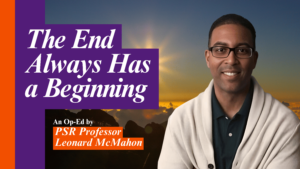An Election Day Reflection by PSR Professor Leonard McMahon, PhD
 America prides itself on being the progeny of the classical era, the modern Rome, but it tends to do so quietly. Few direct comparisons to empireare made, except when it comes to the demise of the republic. The fall of Rome still intrigues. Of course, Rome was not built in a day, and it did not fall in one either. Contrary to how it’s often portrayed in the movies, the apocalypse—the end of the world as we know it—takes a minute.
America prides itself on being the progeny of the classical era, the modern Rome, but it tends to do so quietly. Few direct comparisons to empireare made, except when it comes to the demise of the republic. The fall of Rome still intrigues. Of course, Rome was not built in a day, and it did not fall in one either. Contrary to how it’s often portrayed in the movies, the apocalypse—the end of the world as we know it—takes a minute.
This is especially true for apocalyptic politics. Vice-President Harris frequently contrasts her approach to that of President Trump pitting her fearless optimism versus his reactionary pessimism: joy versus anger; promise versus peril; gratitude versus grievance. What both seem to agree on though is that times are tough, and everyone is justifiably anxious. Without using the word, each side speaks this moment as if it were the apocalypse. Whatever stock we put into it, both sides frame this election as The One. The end is near, which side are you on?
The world has seen this before. In the 6th century, Pope Gregory I, or Gregory the Great, was what many consider an enlightened leader of the Roman Empire in the throes of its decline. Like many in his day, he thought the world was ending, and he was desperate to convert as many people to Christianity as he could. There were arguments about whether such a massive conversion effort would bring about the end of the world or simply signal it, but clearly the imminent destruction of civilization was on everyone’s mind. And there was plenty of evidence in its favor: wars, famines, plagues, and a few attempts to besiege Rome itself.
Those were anxious times, and then as now, many were looking for reasons, and many found them by turning various groups into “they,” “them,” those”—the other. Like Trump Gregory spoke in aggressive terms of the enemies of civilization. For him it was the pagans and the Jews; for Trump it’s immigrants and leftists. Gregory spoke of the urgent need to convert Jews; for Trump it’s the urgency of deportation (apparently conversion through citizenship takes too long). Like Trump, Gregory was vague on detail. He spoke desperately about the end of civilization but was soft on specifics, which of course leaves room for all kinds of extreme policies. “They,” those others, were simply “ruining” things; and since the end was coming, something had to be done. Gregory saw himself as tolerant, and that his blunt political logic was simply a natural outcome of the circumstances: desperate times call for desperate measures. Like Trump, Gregory, also a scion of wealth, thought that, on the whole, his was a measured, even benign, approach to politics. And like Gregory, Trump claims he is friend of the other: The Friend in fact, the one who has done the most. If Gregory had had to campaign (which he didn’t) one can almost hear him saying the same.
But it’s easy to be friends in a monologue. Like Greogry, there is little to no evidence Trump listened to “them,” to southern immigrants, blacks, women, or LGBTQ people. Talking about “them” is not the same as listening.
What both failed to see is that they were spreading fear. Apocalypse or not, fear is never the basis for a positive political outcome. Yes, it is effective in getting results, but it is inappropriate in a democracy. The key to democracy is that what our leaders say and do has to be both effective (results) and appropriate (culture). The right conjunction matters. It cannot be either one; both conditions must be met.
Gregory and other Roman leaders, facing a societal crisis, were desperate for results. Let us hope our leaders are more enlightened.
Dr. Leonard McMahon is Assistant Professor of Pastoral Care, Spirituality, and Theology and Director of the Master of Arts in Social Transformation Program at Pacific School of Religion. He is the founder of Common Ground Dialogue, whose aim is to encourage civility in political life.
